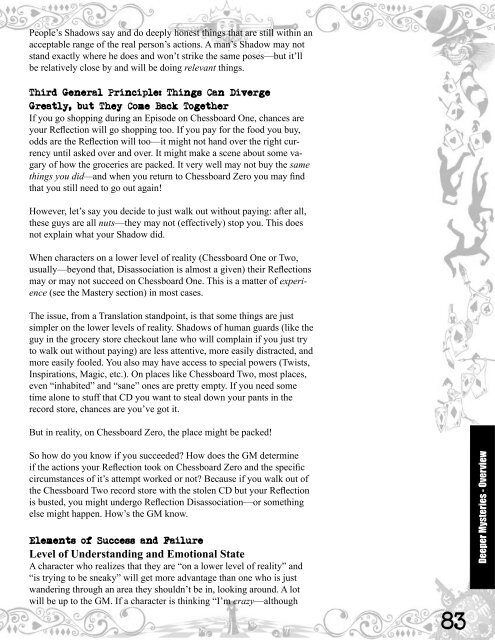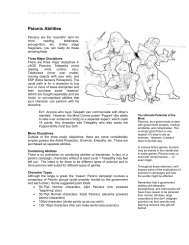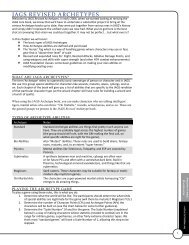Wonderland - Jags
Wonderland - Jags
Wonderland - Jags
You also want an ePaper? Increase the reach of your titles
YUMPU automatically turns print PDFs into web optimized ePapers that Google loves.
People’s Shadows say and do deeply honest things that are still within an<br />
acceptable range of the real person’s actions. A man’s Shadow may not<br />
stand exactly where he does and won’t strike the same poses—but it’ll<br />
be relatively close by and will be doing relevant things.<br />
Third General Principle: Things Can Diverge<br />
Greatly, but They Come Back Together<br />
If you go shopping during an Episode on Chessboard One, chances are<br />
your Reflection will go shopping too. If you pay for the food you buy,<br />
odds are the Reflection will too—it might not hand over the right currency<br />
until asked over and over. It might make a scene about some vagary<br />
of how the groceries are packed. It very well may not buy the same<br />
things you did—and when you return to Chessboard Zero you may find<br />
that you still need to go out again!<br />
However, let’s say you decide to just walk out without paying: after all,<br />
these guys are all nuts—they may not (effectively) stop you. This does<br />
not explain what your Shadow did.<br />
When characters on a lower level of reality (Chessboard One or Two,<br />
usually—beyond that, Disassociation is almost a given) their Reflections<br />
may or may not succeed on Chessboard One. This is a matter of experience<br />
(see the Mastery section) in most cases.<br />
The issue, from a Translation standpoint, is that some things are just<br />
simpler on the lower levels of reality. Shadows of human guards (like the<br />
guy in the grocery store checkout lane who will complain if you just try<br />
to walk out without paying) are less attentive, more easily distracted, and<br />
more easily fooled. You also may have access to special powers (Twists,<br />
Inspirations, Magic, etc.). On places like Chessboard Two, most places,<br />
even “inhabited” and “sane” ones are pretty empty. If you need some<br />
time alone to stuff that CD you want to steal down your pants in the<br />
record store, chances are you’ve got it.<br />
But in reality, on Chessboard Zero, the place might be packed!<br />
So how do you know if you succeeded? How does the GM determine<br />
if the actions your Reflection took on Chessboard Zero and the specific<br />
circumstances of it’s attempt worked or not? Because if you walk out of<br />
the Chessboard Two record store with the stolen CD but your Reflection<br />
is busted, you might undergo Reflection Disassociation—or something<br />
else might happen. How’s the GM know.<br />
Elements of Success and Failure<br />
Level of Understanding and Emotional State<br />
A character who realizes that they are “on a lower level of reality” and<br />
“is trying to be sneaky” will get more advantage than one who is just<br />
wandering through an area they shouldn’t be in, looking around. A lot<br />
will be up to the GM. If a character is thinking “I’m crazy—although<br />
83<br />
Deeper Mysteries - Overview





